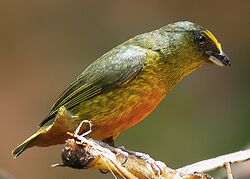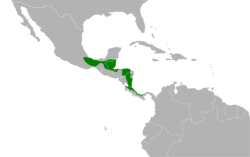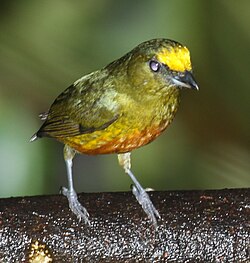Biology:Olive-backed euphonia
| Olive-backed euphonia | |
|---|---|

| |
| Male E. g. praetermissa, Costa Rica | |
| Scientific classification | |
| Domain: | Eukaryota |
| Kingdom: | Animalia |
| Phylum: | Chordata |
| Class: | Aves |
| Order: | Passeriformes |
| Family: | Fringillidae |
| Subfamily: | Euphoniinae |
| Genus: | Euphonia |
| Species: | E. gouldi
|
| Binomial name | |
| Euphonia gouldi Sclater, PL, 1857
| |

| |
The olive-backed euphonia (Euphonia gouldi) is a small passerine bird in the finch family. It is a resident breeder in the Caribbean lowlands and foothills from southern Mexico to western Panama.
The olive-backed euphonia is found in wet forests, tall second growth and adjacent bushy clearings, typically from sea level to 750 m altitude, sometimes up to 1000 m. The spherical cup nest, with a side entrance, is hidden amongst epiphytes or mosses 2–11 m high in a tree. The normal clutch is three brown-marked white eggs.
The adult olive-backed euphonia is 9.5 cm long and weighs 12 g. The adult male has glossy olive upperparts, a yellow forehead, and a rufous belly surrounded by yellow. The adult female has less glossy upperparts than the male, a chestnut forehead, yellow underparts and a small rufous belly patch. Immatures are darker, duller, and have olive underparts.
The olive-backed euphonia occurs in small groups, or as part of a mixed-species feeding flock. This species feeds mainly on small fruits.
The olive-backed euphonia's call is a metallic chrrr-chrrr, and the song is mixture of the call with clear or nasal whistles.
The scientific species name commemorates John Gould, the England ornithologist.
References
- ↑ BirdLife International (2020). "Euphonia gouldi". IUCN Red List of Threatened Species 2020: e.T22722750A137408287. doi:10.2305/IUCN.UK.2020-3.RLTS.T22722750A137408287.en. https://www.iucnredlist.org/species/22722750/137408287. Retrieved 12 November 2021.
- Stiles and Skutch, A guide to the birds of Costa Rica ISBN:0-8014-9600-4
Wikidata ☰ Q937767 entry
 |




